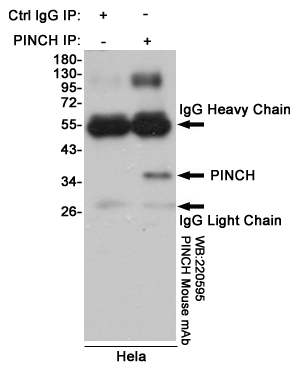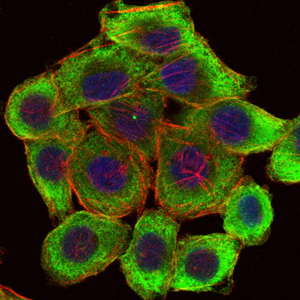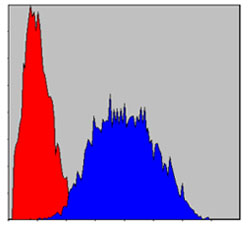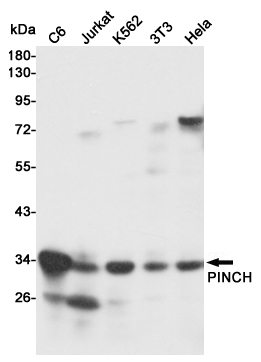-
Product Name
Anti-PINCH (3C12) Mouse antibody
- Documents
-
Description
PINCH (3C12) Mouse monoclonal antibody
-
Tested applications
WB, ICC/IF, FC, IP
-
Species reactivity
Human
-
Isotype
Mouse IgG1
-
Preparation
Antigen: Purified recombinant fragment of human PINCH expressed in E. Coli.
-
Clonality
Monoclonal
-
Formulation
Ascitic fluid containing 0.03% sodium azide.
-
Storage instructions
Store at 4°C short term. Store at -20°C long term. Avoid freeze / thaw cycle.
-
Applications
WB: 1/500 - 1/2000
ICC: 1/200 - 1/1000
FC: 1/200 - 1/400
ELISA: 1/10000
-
Validations

Immunoprecipitation analysis of Hela cell lysates using PINCH mouse mAb.

Immunofluorescence analysis of HepG2 cells using PINCH mouse mAb (green). Blue

Flow cytometric analysis of Hela cells using PINCH mouse mAb (blue) and negative control (red).

Western blot detection of PINCH in C6,Jurkat,K562,3T3 and Hela cell lysates using PINCH mouse mAb (1:1000 diluted).Predicted band size:37KDa.Observed band size:35KDa.
-
Background
Swiss-Prot Acc.P48059.The protein encoded by this gene is an adaptor protein which contains five LIM domains, or double zinc fingers. The protein is likely involved in integrin signaling through its LIM domain-mediated interaction with integrin-linked kinase, found in focal adhesion plaques. It is also thought to act as a bridge linking integrin-linked kinase to NCK adaptor protein 2, which is involved in growth factor receptor kinase signaling pathways. Its localization to the periphery of spreading cells also suggests that this protein may play a role in integrin-mediated cell adhesion or spreading. Several transcript variants encoding different isoforms have been found for this gene.
Related Products / Services
Please note: All products are "FOR RESEARCH USE ONLY AND ARE NOT INTENDED FOR DIAGNOSTIC OR THERAPEUTIC USE"
